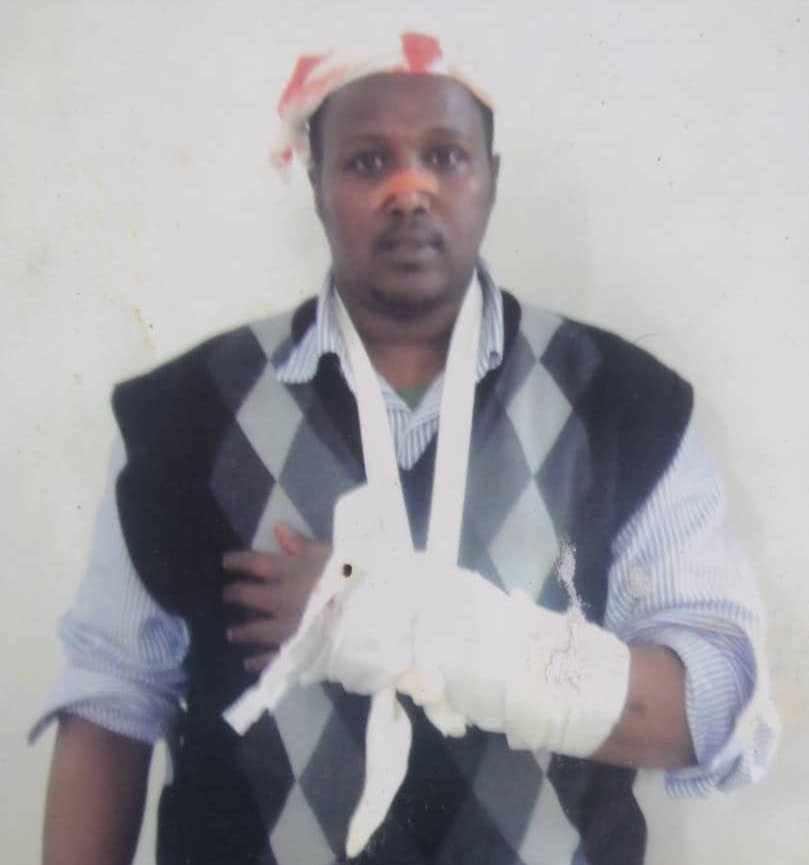|
Getting your Trinity Audio player ready…
|
By Thabani Dube
The African continent and the world at large should unite and address all forms of violence, a survivor of xenophobia in South Africa has said.
In the midst of such injustices, frequently, people suffer in silence, especially men.
No wonder why the death toll is increasing by the day due to depression. People judge each other based on outlook while others expect one to just be brave or wish away terrible circumstances or experiences.
However, only a few can tell their story, as the saying goes a problem told is half solved.
Life has never been the same for Abdulahi Dirier Warsame (47) since the 23 May 2008 xenophobia attacks he suffered in Cape Town, South Africa.
It is not easy to tell a story, especially one that invokes memories of the barbaric murder of one’s loved one at the hands of a community one would have sought refuge in, after escaping from one’s own country due to civil conflict.
“My cousin, Muhammad aged 28 years at the time of his death – with whom I was running my two grocery tuck-shop businesses we had established in Kayamadi location in Stalambush and Khayelitsha, Cape Town, was brutally smitten by a machete on his head on that day, early in the morning.
“He must have died instantly. He was inside the tuck-shop when the South Africans ran amok beating, killing, and looting any foreigner they came across. They tortured me saying give us the money while pouring boiling water on my shins and pouncing on me until I fell unconscious,” narrates Abdulahi about his ordeal.
Abdulahi, together with others left Somalia on 1 January 2005 by boat and travelled along the Indian Ocean to Mozambique before they continued to a place that borders Eswatini, Mozambique, and South Africa in a seven-day voyage.
Thereafter, they continued by road to Johannesburg by bus.
“We were a group of 21 Somalis when we travelled after my elders back home had advised me to flee to some foreign land for safety and greener pastures after my father was murdered.
“Upon my arrival in Joburg, some Somalis community helped me to get a phone and transport money to go to Cape Town where I established myself and started working in Wynberg Town at a grocery supermarket,” he said.
After a year, he had raised enough money to start his own tuck-shop business.
“A friend of mine showed me a place to let in Khayelitsha where I then opened a mini-grocery shop which flourished until the day we were attacked.
“In the following year, 2007, I opened another one at Kayamadi location in Stelenbosh Town,” said Abdulahi.
What traumatizes Abdulahi apart from losing his fruits of hard work which included a 323 Mazda car is that he did not witness the burial of Muhammad to put a closure to the end of their companionship.
“After I fell unconscious, I woke up at a hospital; some good Samaritans had taken me there. My arm was also broken and I spent two weeks in the hospital before I was taken to Young Field Military Camp where most foreigners were taken to for safety,” narrates Abdulahi.
He added: “Then the South African government authorities came and advised everyone to return to the communities where we were residing but with my experience, it was very difficult to go back. It was hell to me,” said a tearful Abdulahi.
He said that while at the military camp, he met a Zimbabwean from Chipinge who advised him to try to go to Zimbabwe, where at least the environment was peaceful.
“My friend advised me to come with him to Zimbabwe since the people are peaceful, loving, and welcoming. We came together until I reached Tongogara Refugee Camp in Manicaland Province on 20 August 2009, where I was given Refugee Status in terms of the 1969 AU Convention.
“I am thankful to the Zimbabwean Government and United Nations authorities for helping me settle here. I now have an identity document, a driver’s license, and a passport,” added Abdulahi.
Abdulahi judging by the outlook, one would say he is a happy person but inside he feels unsafe, especially when he sees or hears any news about xenophobia attacks in SA.
“In 2016 I applied for resettlement but I haven’t got any luck so far. It is not that I am not satisfied staying in Zimbabwe. No. But I have been traumatized by the experiences and still wonder how I am going to heal. Maybe resettling to another foreign continent like America or Canada may put closure and heal my heart,” said Abdullahi.
